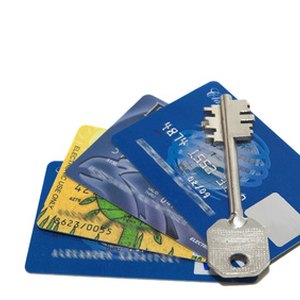
A bank account can be accessed in many ways. When someone gets access to your account, that person can take funds without your knowledge. If you want to stop unwanted access, you have to take the appropriate steps. In some cases, individuals can have access to your account based on the status of the account. To safeguard your account and make sure your funds are secure, you have to reduce the chance of fraudulent activity taking place.
Make sure all automatic debits are canceled. If a merchant is debiting your account without your permission, the best thing to do is dispute the transaction with your bank. The merchant will be contacted by your bank to resolve the issue. Some banks will give you a credit for the transaction immediately while the investigation is pending.
Hide your PIN codes. If someone gets your four-digit PIN for your ATM/debit card, he can withdraw money from your bank account if he gets your card. Depending on the rules and regulations of the bank, you may be held liable for PIN-based transactions. This policy can vary.
Manage your bank account online. Change your passwords on a regular basis. Use passwords that are not easy to discover. Avoid using your address or zip code as a password. If you access your bank account information online, do not use public computers. Some public computers can have devices attached designed to monitor your keystrokes, which can track your user name and password, according to Scambusters.
Close your account. If you have a joint owner on a bank account and you don’t want him to access the account any longer, you can close the account. You can open a new bank account along with a new account number. You can re-deposit the money from the old account into the new account. You will be the only one with access to the account. Make sure all automatic payments to Internet services, car insurance and loan payments have been canceled prior to closing the account. Call each merchant and give it the new bank account number.
References
- Scambusters: Is Your Bank Account Safe?
- Federal Deposit Insurance Corporation. "FDIC Community Banking Study," Page 1. Accessed April 24, 2020.
- Northwestern Mutual. "Here's the Difference Between Banks, Credit Unions and Brokerages." Accessed April 24, 2020.
- Federal Reserve Bank of New York. "The Impact of Network Size on Bank Branch Performance," Page 6. Accessed April 24, 2020.
- American Express Co. "APY vs. APR: The Basics About How Interest Is Calculated." Accessed April 24, 2020.
- Consumer Financial Protection Bureau. “Checklist for Opening a Bank or Credit Union Account,” Page 1. Accessed April 24, 2020.
- Federal Deposit Insurance Corporation. "Learning Bank - Checking & Savings Accounts." Accessed April 24, 2020.
- U.S. Securities and Exchange Commission. "Certificates of Deposit (CDs)." Accessed April 24, 2020.
- Wells Fargo. "Compare Checking Accounts." Accessed April 24, 2020.
- GovInfo. ”Public Law 107–56—Oct. 26, 2001,” Page 47. Accessed April 24, 2020.
- CalFirst. "Important Information About Opening an Account." Accessed April 24, 2020.
- Federal Trade Commission. "Lost or Stolen Credit, ATM, and Debit Cards." Accessed April 24, 2020.
- Smart Financial. "Forms And Applications." Accessed April 24, 2020.
- HelpWithMyBank.gov. "Answers About Funds Availability: Can the Bank Place a Hold on Deposits Made in Cash?" Accessed April 24, 2020.
- HelpWithMyBank.gov. "Answers About Funds Availability: I Deposited a Local Check. When Will My Funds Be Available/Released From the Hold?" Accessed April 24, 2020.
Writer Bio
Melvin J. Richardson has been a freelance writer for two years with Associated Content, and writes about topics such as banking, credit and collections, goal setting, financial services, management, health and fitness. Richardson has worked for several banks and financial institutions and gained invaluable experience and knowledge. Richardson holds a Master of Business Administration in Executive Management from Ashland University in Ashland Ohio.

